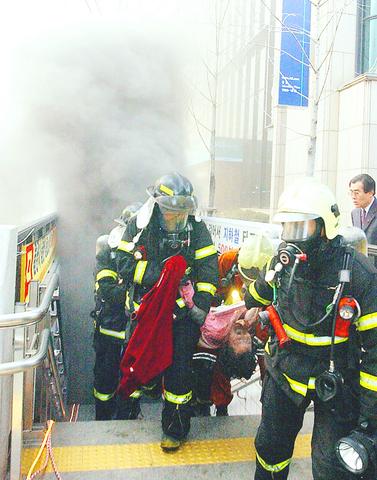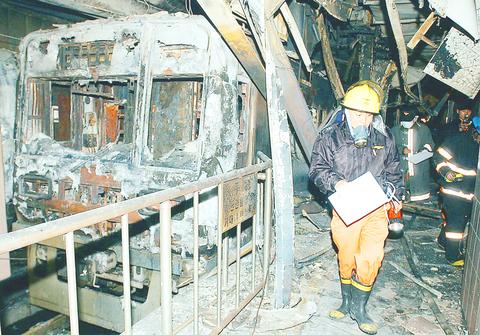About 120 people were killed in South Korea and scores were missing yesterday after flames and smoke engulfed two crowded subway trains following an arson attack, officials said.
The mayor of the southeastern city of Daegu said a 56-year-old male with a history of mental illness was suspected of starting the blaze at the end of the morning rush hour.
A witness said the man had set fire to flammable liquid in a milk carton and tossed it into a carriage.

PHOTO: AP
Officials said a second train pulled into the station as the blaze took hold. The two trains, each with six carriages, had a total of up to 400 people on board.
Daegu Fire Chief Kim Shin-dong told reporters there were more than 70 unidentified charred bodies in the burned-out subway cars, which together with an official figure of 49 dead from hospitals took the toll to around 120.
Figures had switched throughout the day, with many bodies burnt so badly they were impossible to identify immediately.

PHOTO: AP
An official at the Daegu Emergency Rescue Center had said earlier that 134 people had died. Scores of people were still unaccounted for and feared dead.
Many struggled in vain to escape the inferno that reduced the trains to metal skeletons and sent black, acrid smoke belching into the sky for hours after the fire started.
Television footage showed rescuers covering up charred bodies in the ash and soot-filled carriages, a burnt shoe among the wreckage. At street level, relatives and friends gathered anxiously to look through a list of names or held each other and cried.
The number of injured on a board at the emergency center was put at 135, with 159 missing. It was unclear whether the missing included the 70 corpses the fire chief said were still in the trains.
Rescue official Lee Hyong-kyun said the fire ignited seat fabric and floor tiles.
"If you ignite a flammable liquid like gasoline inside a closed space, what you'll get is something very close to an explosion," he said. "There would have been hardly any time to escape."
As dense smoke billowed from subway air vents, soot-covered firefighters in orange suits and with breathing apparatus dragged bodies and the injured up blackened stairwells.
One man, whose wife was trapped by the inferno, told South Korean television he had received a desperate call from her mobile phone.
"Help me," he quoted her as saying. "There's a fire on the subway. The door is locked."
It was a heart-wrenching call others were to make.
"My daughter called me twice at 9.57am crying `mother there's smoke everywhere, but the door won't open!" said a woman at a makeshift crisis center outside Daegu's Joongangro Station.
Rescue officials said they would tow the carriages to a hub station yesterday evening so forensic experts could examine victims' remains.
A fireman in Daegu, which is 300km southeast of Seoul, said the trains had been gutted.
"Everything is gone," said Sung Bo-hun, who was inside the subway until 7:40pm. "You can't recognize the people inside. It is all black and grey."
Telephone firms were helping people find out for sure if their relatives were on the trains by tracing mobile-phone signals.
More than 100 people were killed and another 100 injured in a gas explosion on Daegu's only subway line in 1995.
Yonhap quoted one witness as saying passengers had tried in vain to tackle the suspect in yesterday's blaze. Another said many passengers were trapped behind closed doors.
"When the fire broke out, the people close to the gap between the cars appear to have escaped, but those in the middle of the carriage were helpless," a fireman said.
Most of those injured were being treated for smoke inhalation.

FREEDOM OF NAVIGATION: The UK would continue to reinforce ties with Taiwan ‘in a wide range of areas’ as a part of a ‘strong unofficial relationship,’ a paper said The UK plans to conduct more freedom of navigation operations in the Taiwan Strait and the South China Sea, British Secretary of State for Foreign, Commonwealth and Development Affairs David Lammy told the British House of Commons on Tuesday. British Member of Parliament Desmond Swayne said that the Royal Navy’s HMS Spey had passed through the Taiwan Strait “in pursuit of vital international freedom of navigation in the South China Sea.” Swayne asked Lammy whether he agreed that it was “proper and lawful” to do so, and if the UK would continue to carry out similar operations. Lammy replied “yes” to both questions. The

SECOND SPEECH: All political parties should work together to defend democracy, protect Taiwan and resist the CCP, despite their differences, the president said President William Lai (賴清德) yesterday discussed how pro-Taiwan and pro-Republic of China (ROC) groups can agree to maintain solidarity on the issue of protecting Taiwan and resisting the Chinese Communist Party (CCP). The talk, delivered last night at Taoyuan’s Hakka Youth Association, was the second in a series of 10 that Lai is scheduled to give across Taiwan. Citing Taiwanese democracy pioneer Chiang Wei-shui’s (蔣渭水) slogan that solidarity brings strength, Lai said it was a call for political parties to find consensus amid disagreements on behalf of bettering the nation. All political parties should work together to defend democracy, protect Taiwan and resist

By refusing to agree spending increases to appease US President Donald Trump, Spanish Prime Minister Pedro Sanchez threatened to derail a summit that NATO Secretary-General Mark Rutte needs to run smoothly for the sake of the military alliance’s future survival. Ahead of yesterday’s gathering in The Hague, Netherlands, things were going off the rails. European officials have expressed irritation at the spoiler role that Sanchez is playing when their No. 1 task is to line up behind a pledge to raise defense spending to 5 percent of GDP. Rutte needed to keep Spain in line while preventing others such as Slovakia

SHIFT PRIORITIES: The US should first help Taiwan respond to actions China is already taking, instead of focusing too heavily on deterring a large-scale invasion, an expert said US Air Force leaders on Thursday voiced concerns about the Chinese People’s Liberation Army’s (PLA) missile capabilities and its development of a “kill web,” and said that the US Department of Defense’s budget request for next year prioritizes bolstering defenses in the Indo-Pacific region due to the increasing threat posed by China. US experts said that a full-scale Chinese invasion of Taiwan is risky and unlikely, with Beijing more likely to pursue coercive tactics such as political warfare or blockades to achieve its goals. Senior air force and US Space Force leaders, including US Secretary of the Air Force Troy Meink and